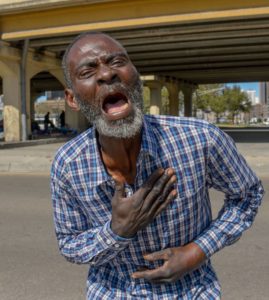“Third World and Ashamed of It” by Folwell Dunbar (Ecuador)
Thanks for the ‘Heads Up’ about the following article from Carol Scott (Ethiopia 1966-68)
•
Third World and ashamed of it
Published in the New Orleans Advocate
December 27, 2016

Clint Thomas Daniels, a homeless man, says he needs help and housing as he talks passionately by tents underneath the U.S. 90 Pontchartrain Expressway near S. Rampart Street in New Orleans, La. Wednesday, March 2, 2016. The New Orleans Building Corporation (NOBC), the City of New Orleans public benefit corporation, announced that it will erect fencing around the surface parking lots under the Expressway along Calliope Street from St. Charles Avenue to S. Rampart Street and Loyola Avenue so that they may be returned to commerce as managed parking. Advocate staff photo by Matthew Hinton
As a Peace Corps volunteer in Ecuador, I lived and worked with people who had very little.
There were children selling Chiclets on the square, women cooking tortillas on makeshift grills on sidewalks, young men singing on buses and trains, prostitutes advertising themselves in alleys, and elderly shaking tin cans on street corners. Poverty was a way of life for many.
I came to define “Third World” by the number of people eking out an existence on the street, and by the way in which the government supported them (or didn’t). In reality, the definition is far more complicated, and the term itself is misleading and controversial.
By my definition, though, Ecuador was certainly “Third World.” The other day I was walking down Canal Street in downtown New Orleans. Over a stretch of about eight blocks, I was approached by five different people begging for money and food. I also saw two people sleeping on cardboard mats beneath storefront awnings. At almost every major intersection in the city, there is a homeless person soliciting for handouts; and, beneath an overpass, there is a veritable city of tents. It reminds me of Ecuador. Years ago, there was a popular bumper sticker that read: “Louisiana, Third World and Proud of It!” Back then I thought it was funny. Today, it makes me feel ashamed.
Folwell Dunbar (Ecuador 1989-92)
New Orleans
•
Folwell Dunbar is an educator, artist and survivor of many quagmires of despair. He can be reached at fldunbar@icloud.com
Folwell, Thanks for this. It reminds me of a homeless Haitian man I met under a bridge in Miami who told me he wished he’d stayed in Haiti; it was better there! I know what it was like in Haiti because I lived and worked there. His comment shocked me, but I knew it was the truth.
I share your shame whenever I see desperate people on the streets in our country. My husband and I do a lot of volunteering for the homeless but, as you know, it’s always a drop in the bucket; at best a pebble in a lake. These activities keep us from succumbing to the “quagmire of despair.” So, I hope you won’t sink into yours.
Keep the light on.
Leita Kaldi Davis
(Senegal 1993-96)
Thank you for reminding us of this human misery. It seems the world has a new nation, one without traditional borders, common language or customs. its citizens, however, have two things in common: their suffering and invisibility. Peru, 1962-64
Folwell, I experienced a similar situation when I returned from the Peace Corps in the middle 70’s and managed a low income housing project in the Denver area. When I made a comment at a local hearing of some sort on how appalled I was to return to my country and find the level of poverty and despair among so many of the tenants the judge asked me to sit down because my comments were “political.” In the end a country’s level of development whether “underdeveloped”, “developing”–whatever–can be determined by how it treats it’s children and the poorest of the poor and this is where American “exceptionalism” falls far short of the rhetoric. I’ll touch on some of these contrasts in my soon to be published book, “Different Latitudes: My Life in the Peace Corps and Beyond” as we not only bring back a new perspective of the world after the Peace Corps but a new perspective on our own country.
Mark Walker, Guatemala, 1971-73.